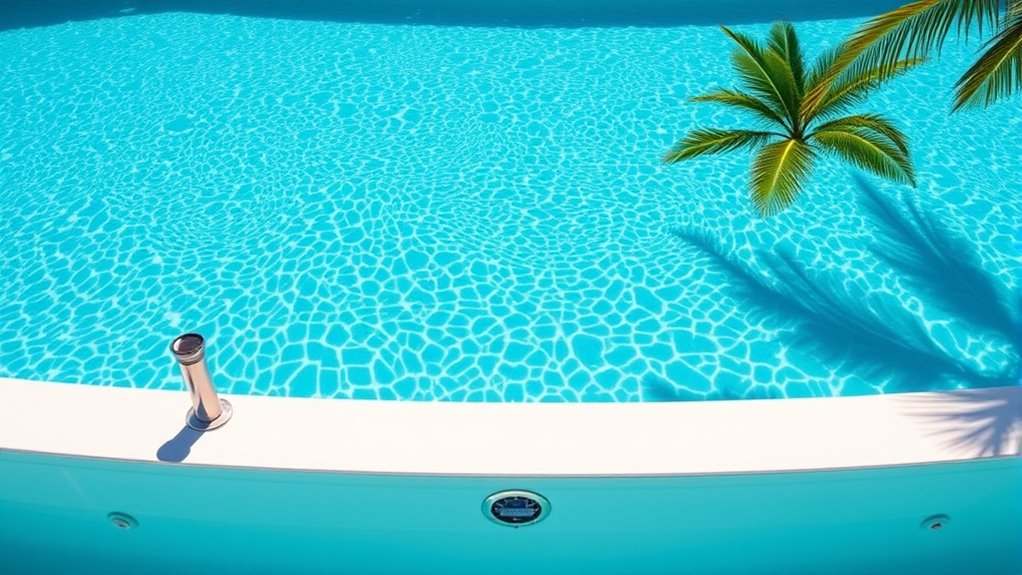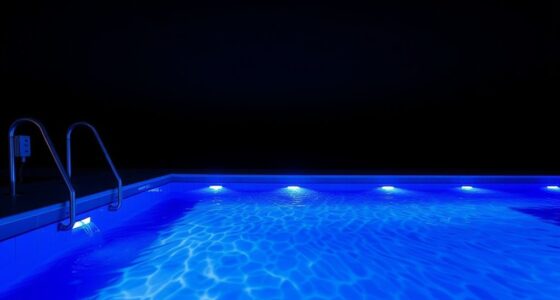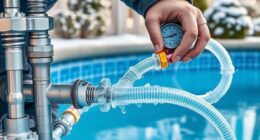Many believe saltwater pools are maintenance-free, but they still need regular testing of chlorine, pH, and salt levels to keep water safe and clear. Common myths suggest they don’t require much upkeep, but routine cleaning, chemical adjustments, and equipment checks are essential for longevity and cost efficiency. Understanding the true costs, ongoing care, and potential issues can save you time and money—stick around to discover how to keep your saltwater pool in top shape.
Key Takeaways
- Saltwater pools generate chlorine automatically but still require regular testing and chemical adjustments for safe water quality.
- Common myths include the belief that saltwater pools are maintenance-free; ongoing monitoring remains essential.
- Routine upkeep involves cleaning the salt cell, testing water chemistry, and balancing pH, alkalinity, and chlorine levels.
- Long-term costs include chemical replenishment, equipment repairs, possible upgrades, and increased energy expenses.
- Proper maintenance minimizes corrosion, prevents algae and cloudiness, and extends equipment lifespan for a trouble-free swimming experience.
Understanding How Saltwater Pools Work
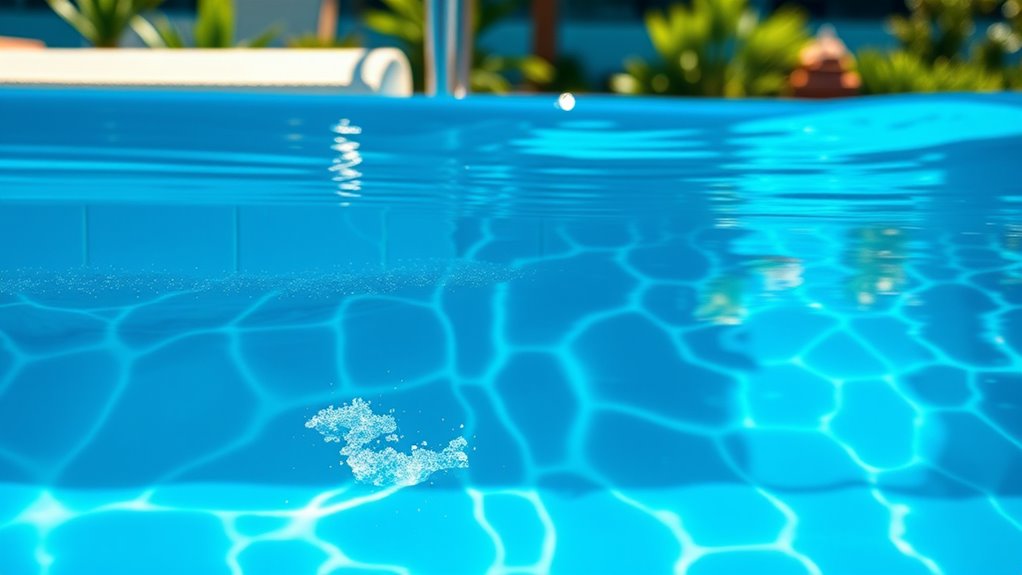
Saltwater pools use a process called electrolysis to generate chlorine, which keeps the water clean and sanitized. When you add salt to your pool, it dissolves into sodium and chloride ions. As the water passes through the salt cell, an electrical current activates, causing a chemical reaction that produces chlorine gas. This chlorine then dissolves into the water, killing bacteria and algae. Unlike traditional chlorine pools, you don’t need to manually add chlorine regularly, as the system produces it automatically. This process maintains a consistent level of sanitation, making your pool safer and reducing chemical handling. Additionally, juice cleansing and detox methods are sometimes used to improve overall health, which can be a consideration for pool owners looking to promote wellness. Understanding this mechanism helps you realize why saltwater pools are often considered more convenient and gentle on the skin compared to traditional chlorinated pools.
Common Myths About Saltwater Pool Maintenance
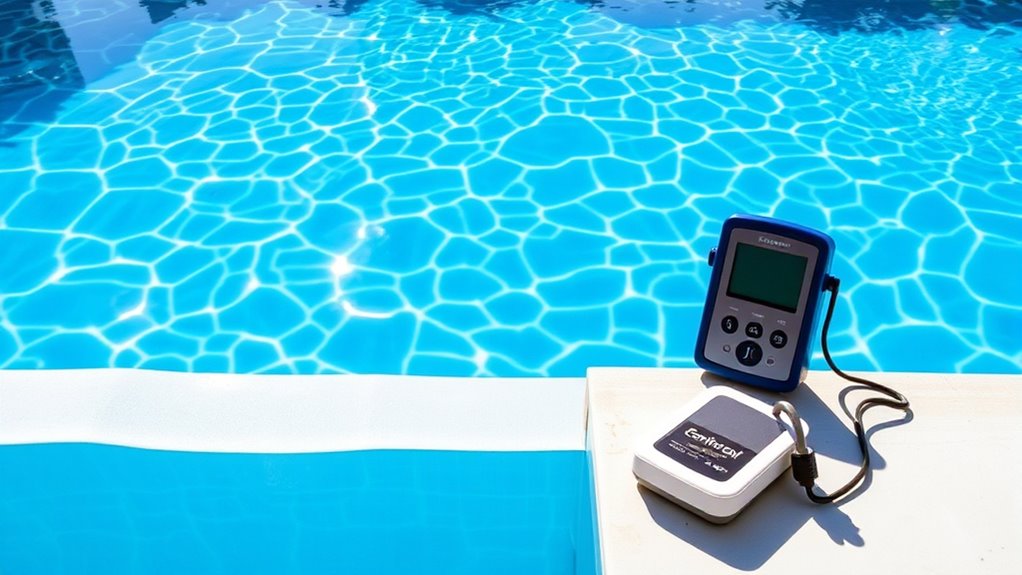
Many people believe that a saltwater pool doesn’t require chlorine, but that’s a misconception. While saltwater pools generate chlorine, you still need to monitor and maintain proper levels regularly. Plus, some think they’re easier to care for, but consistent upkeep is essential for clear, safe water. Proper water quality management ensures your pool stays in optimal condition and prevents issues like algae growth or bacteria buildup.
Saltwater Means No Chlorine
Despite common beliefs, a saltwater pool doesn’t eliminate the need for chlorine. Instead, it produces chlorine naturally through the salt-chlorine generator. This means you still have to manage chlorine levels, but they tend to stay more stable. Many think saltwater pools don’t require chlorine addition, which isn’t true. Regular testing and balancing are essential to keep the water safe and clear. The misconception might come from the softer feel and fewer chemical smells, but chlorine remains active in disinfecting. Here’s a quick overview:
| Myth | Reality | Tip |
|---|---|---|
| No chlorine needed | Chlorine is still necessary | Test weekly for proper levels |
| Salt replaces all chemicals | Additional balancing chemicals are often needed | Use algaecides and pH adjusters |
| Chlorine is harmful | Proper levels ensure safe swimming | Keep chlorine within recommended ranges |
Additionally, ongoing monitoring and adjustment are vital for maintaining water quality and ensuring safety.
Maintenance Is Easier
A common misconception is that maintaining a saltwater pool is simpler than traditional chlorinated pools. While it may seem easier initially, saltwater pools still require regular upkeep. You’ll need to monitor the salt levels, pH balance, and alkalinity, just like with a conventional pool. The salt generator automates chlorine production, but it doesn’t eliminate the need for testing and adjustments. Additionally, you’ll still need to clean filters and check equipment regularly. Some tasks may be less frequent, but they’re not eliminated. Overall, saltwater pools can be easier regarding chemical management, but they still demand consistent maintenance. Expect to spend time on routine checks and minor repairs, just like with any pool. The myth that maintenance is completely hands-off isn’t accurate. Wall organization can help keep your pool area tidy and enhance overall home decor.
Routine Upkeep for a Healthy Saltwater System
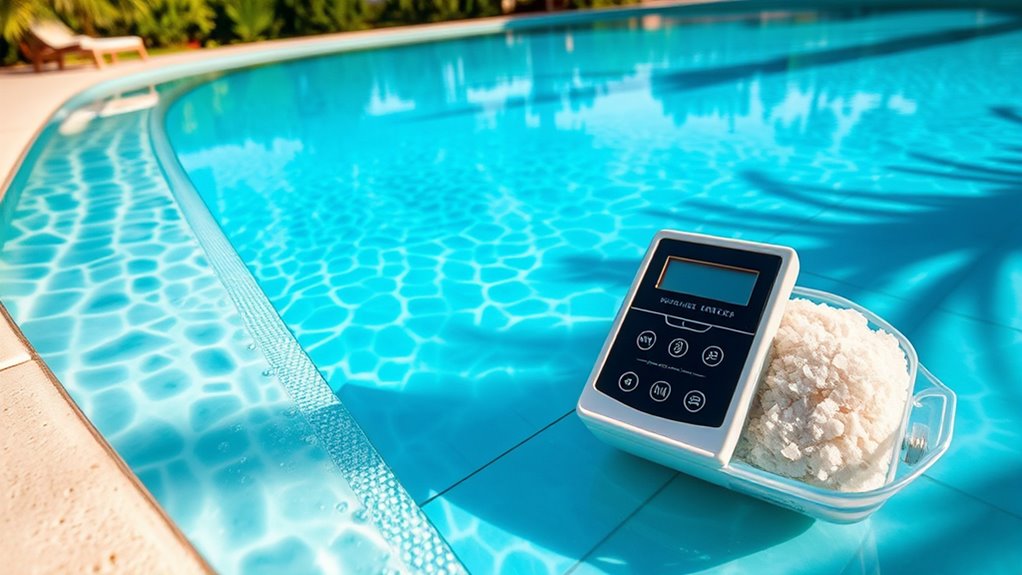
Regular maintenance is essential to keep your saltwater pool system healthy and functioning properly. Consistent upkeep prevents issues before they arise and extends the lifespan of your equipment. Focus on routine tasks like cleaning the salt cell, checking for debris, and inspecting the system for leaks or corrosion. Keeping these in check ensures your pool stays clear and safe for swimming. You should also:
- Clean the salt cell regularly to prevent buildup that can hinder chlorine production
- Remove leaves and debris from the pool surface to avoid clogging filters
- Inspect and tighten connections to prevent leaks and maintain system efficiency
- Monitor the system’s performance and efficiency to catch potential issues early and ensure optimal operation
Performing these simple tasks weekly keeps your saltwater pool in top shape and minimizes costly repairs down the line. Regular upkeep makes pool ownership more enjoyable and hassle-free.
Monitoring and Adjusting Salt Levels and Chemicals
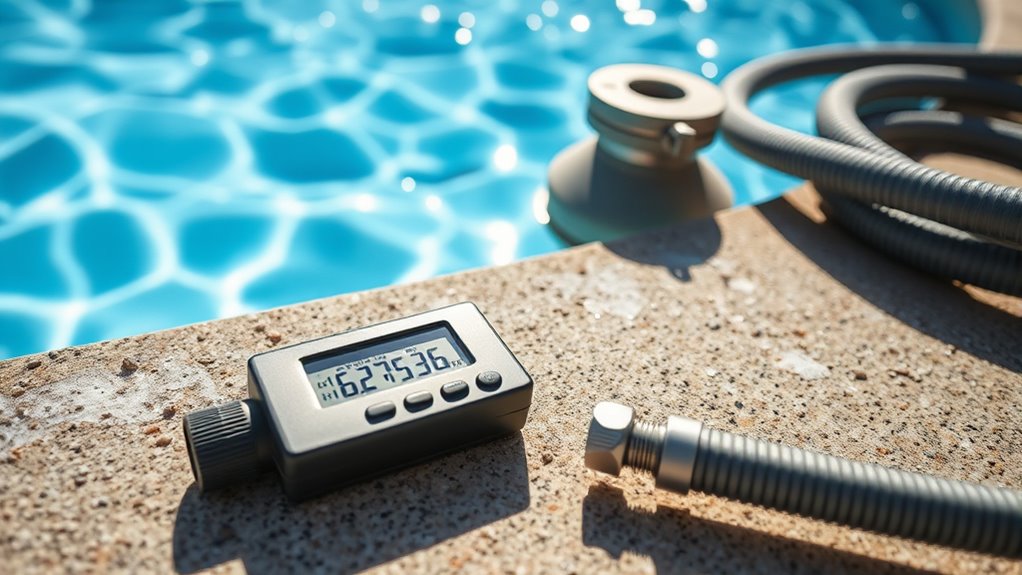
You need to regularly check your salt levels to guarantee your system functions properly and stays balanced. Adjust the salt concentration if it’s too high or low to keep the water crystal clear. Additionally, monitor the pH and chlorine levels to maintain a safe, comfortable swimming environment. For optimal results, consider using whole-house water filtration systems to ensure your pool water remains clean and well-balanced.
Maintaining Proper Salt Balance
Maintaining proper salt balance is essential for keeping your saltwater pool safe and functioning efficiently. If the salt levels are too low, your system may struggle to produce enough chlorine, leading to potential bacteria growth. Too high, and it can cause equipment stress or damage. Regularly test your salt levels with reliable test kits, aiming for the manufacturer’s recommended range. Adjust salt levels by adding more salt or diluting with fresh water as needed. Keep an eye on the water’s clarity, as cloudy water can indicate imbalanced salt or chemical levels. Consistent monitoring guarantees your pool’s system runs smoothly and reduces costly repairs. Using calibrated test kits for accurate readings is crucial, and proper storage of chemicals can prevent contamination. Add salt gradually to avoid overshooting your target level. Rinse equipment regularly to prevent salt buildup.
Balancing Ph and Chlorine
Monitoring and adjusting pH and chlorine levels are crucial for ensuring your saltwater pool stays safe and clear. You should check these levels regularly using test strips or a digital meter. Maintaining a pH between 7.2 and 7.6 ensures your chlorine works effectively and prevents scale or corrosion. If the pH is too high, add a pH decreaser; if it’s too low, use a pH increaser. Chlorine levels should stay between 1 and 3 ppm for proper sanitation. If chlorine drops too low, add chlorine tablets or liquid chlorine; if it’s too high, allow it to dissipate naturally or dilute the water. Consistent monitoring and timely adjustments keep your pool balanced, safe, and comfortable for swimming. Additionally, understanding the specific requirements for saltwater pool care can help you optimize your maintenance routine.
Long-Term Costs and Budgeting for Your Pool

Long-term costs for a saltwater pool can add up quickly if you’re not prepared. Maintenance expenses, equipment upgrades, and energy bills can strain your budget over time. To stay on top of costs, consider these factors:
- Salinity and chemical adjustments: Regularly monitoring and replenishing salt and balancing chemicals prevent costly repairs.
- Pool equipment replacement: Saltwater systems and filters may need upgrades or repairs after several years.
- Energy consumption: Pumps and heaters can drive up your electricity bill, especially during peak season.
- Understanding corrosion issues associated with saltwater pools can help you prevent damage to pool components and extend their lifespan.
Troubleshooting Common Saltwater Pool Issues
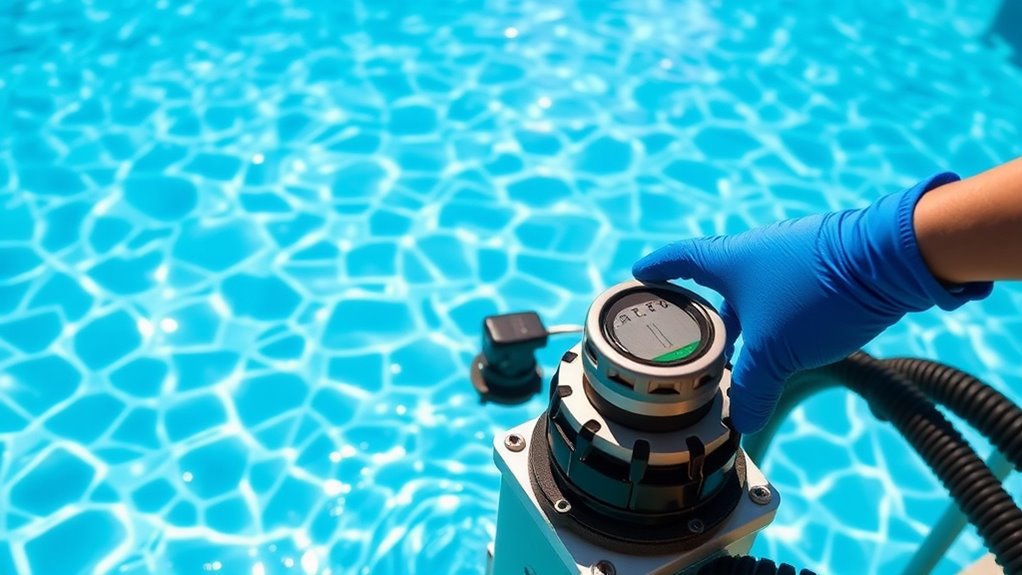
Even with proper budgeting, saltwater pools can still face common issues that disrupt your swim. One frequent problem is algae growth, which occurs if your chlorine levels drop too low; brushing the walls and adjusting sanitizer levels usually solves this. If you notice cloudy water, it might be due to imbalanced pH or insufficient filtration. Test your water regularly and adjust chemicals as needed. Corrosion can also happen, especially around metal fixtures, caused by high salt levels or poor water balance. To prevent this, keep your salt levels within the recommended range and inspect equipment frequently. Ultimately, if your salt cell isn’t producing enough chlorine, it may need cleaning or replacement. Regular maintenance and monitoring help catch issues early, keeping your pool crystal clear and ready for swimming. Building your own outdoor kitchen and pizza oven can be a rewarding project that enhances your backyard experience.
Frequently Asked Questions
How Does Weather Affect Saltwater Pool Chemistry?
Weather considerably affects your saltwater pool chemistry. Hot, sunny days cause more evaporation, increasing salt and chemical concentrations, so you’ll need to top off water and adjust chemicals accordingly. Rain dilutes pool chemicals, lowering their levels and possibly throwing off balance, while wind can introduce debris and affect pH levels. Regular testing and adjustments are essential to keep your saltwater pool balanced and safe, regardless of weather changes.
Can Saltwater Pools Be Used in Cold Climates?
Yes, you can use saltwater pools in cold climates, but you’ll need to take extra steps. Keep your pool heated to prevent freezing and damage to the equipment. Use a pool cover to retain heat and reduce evaporation. You should also monitor the salt levels regularly, as colder temperatures can affect water chemistry. With proper winterization, your saltwater pool can be enjoyable year-round, even in chilly climates.
What Are the Environmental Impacts of Saltwater Pools?
Saltwater pools can impact the environment through the release of excess salt into nearby soil and water, which may harm plants and aquatic life. Additionally, some pool maintenance chemicals can introduce pollutants. You might also use more energy for saltwater chlorination systems, contributing to greenhouse gas emissions. To minimize your environmental footprint, consider regular maintenance, responsible chemical use, and eco-friendly system choices.
Are Saltwater Pools Suitable for Allergy Sufferers?
Saltwater pools can be suitable for allergy sufferers, but it depends on individual sensitivities. You might find that saltwater feels gentler on your skin and eyes compared to traditional chlorinated pools. However, some people with allergies to salt or other pool chemicals may still experience irritation. It’s best to test the water regularly and consult your doctor to determine if a saltwater pool suits your allergy needs.
How Do I Convert a Traditional Pool to Saltwater?
Think of converting your traditional pool into a saltwater oasis like switching from a bicycle to a motorcycle—you’ll get a smoother, more effortless ride. To do it, you’ll need to install a salt chlorine generator, then gradually add salt until it reaches about 3,000 ppm. Balance your pH and alkalinity, run the system regularly, and soon you’ll enjoy a more natural, less harsh swimming experience.
Conclusion
So, now that you’re armed with the truth about saltwater pools, go ahead—dive in confidently. Just remember, maintaining a saltwater pool isn’t magic; it’s chemistry with a splash of patience. Ignore the myths, stay on top of your routine, and avoid turning your backyard oasis into an expensive science experiment. Because who wouldn’t want a sparkling pool that’s easier on the skin, right? Happy swimming—just don’t forget to check those salt levels!
